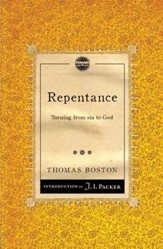Quotes about Repentance-Fruits
True repentance starts with the recognition of the holiness of our God. We cannot rightly perceive the greatness of his goodness without apprehending the puniness of our own. Such a realization causes us to fall down in humility before God.
Holiness by Grace, Crossway, p. 72. Get this book!
Genuine repentance is not a convenient escape hatch after a weekend or a life of folly. It means admitting specific wrong, recognizing your offensiveness to God, changing course, turning to Christ, and wishing with all your heart you had never made the mistake you now despise.
That All May See Progress by Kevin DeYoung taken from The Hole in Our Holiness by Kevin DeYoung, copyright 2012, Crossway Books, a division of Good News Publishers, Wheaton Illinois 60187, www.crosswaybooks.org, p. 141.
The sure test of the quality of any supposed change of heart will be found in its permanent effects. Whatever, therefore, may have been our inward experience, whatever joy or sorrow we may have felt, unless we bring forth fruits meet for repentance, our experience will profit us nothing. Repentance is incomplete unless it leads to confession and restitution in cases of injury; unless it causes us to forsake not merely outward sins, which others notice, but those which lie concealed in the heart; unless it makes us choose the service of God and live not for ourselves but for Him. There is no duty, which is either more obvious in itself, or more frequently asserted in the Word of God, than that of repentance.
Genuine repentance will make itself evident by its deeds and attitudes (Lk. 3:8; Ac. 26:20). The repentant person will:
1. Freely acknowledge his sin (1 Jn. 1:9; Pro. 28:13a).
2. Cease the activity for which he was disciplined or at least seek help if it’s a case of life dominating patterns (Pro. 28:13b; Gal. 6:1f; Jam. 5:19-20).
3. Make restitution and/or ask for forgiveness from those hurt as it is applicable (Phil. 18-19; Matt. 5:23-24).
4. He/she will demonstrate a genuine change of heart, a real concern and godly sorrow over his actions, not in order to be forgiven, but because of the harm caused to the glory of God and the hurt caused others (2 Cor. 7:8-11; Ps. 51:17).
5. He/she will begin to manifest the fruit of the Spirit and a concern for the things of Christ (Gal. 5:22f).
Genuine repentance consists of more than outward sorrow and tears (2 Corinthians 7:9-11). Repentance will be considered genuine when the offender not only leaves his sin, but also confesses it to all who are affected by it (even to the general membership of the church if necessary, as determined by the elders), and makes restitution when appropriate (Jim Elliff and Daryl Wingerd).
Restoring Those Who Fall, Christian Communicators, 2006, p. 13, www.CCWtoday.org. Used by Permission.
Godly sorrow springs from a view of a suffering Savior, and manifests itself by hatred of self, abhorrence of sin, groaning over our backslidings, grief of soul for being so often entangled by our lusts and passions, and is accompanied by softness, meltings of heart, flowings of love to the Redeemer, indignation against ourselves, and earnest desires never to sin more.
Sin forsaken is one of the best evidences of sin forgiven.







